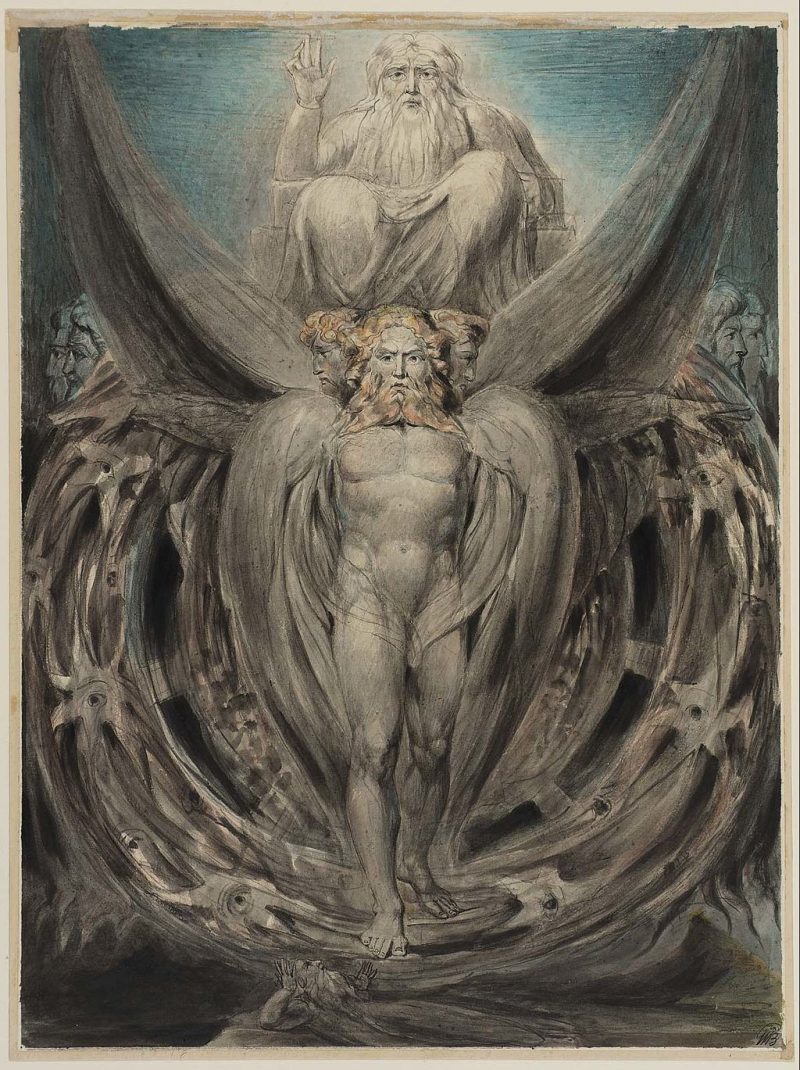Wednesday, August 22, 2024
Memorial of the Queenship of the Blessed Virgin Mary
(click here to listen to or read today’s scriptures)
John Donne, William Blake, Jeremiah and Ezekiel
I will sprinkle clean water upon you and cleanse you from all your impurities and idols. I will give you a new heart and place a new spirit within you.
In 84 Charing Cross Road, the film, (at around the 1:15 mark) one book lover writes to another, quoting John Donne’s Meditation XVII:
All mankind is… one volume; when one man dies, one Chapter is not torn out of the book, but translated into a better language; and every Chapter must be so translated; God employs several translators; some pieces are translated by age, some by sickness, some by war, some by justice; but God’s hand… shall bind up all our scattered leaves again, for that Library where every book shall lie open to one another.
She also has something to say about William Blake:
When as a little boy William Blake saw the prophet Ezekiel under a tree amid a summer field, he was soundly trounced by his mother. I’m with his mother. I mean, the back of the Lord God, the face of the Virgin Mary, all right. But why the hell would anybody want to see the prophet Ezekiel?
Well, Blake would.
In fact his paintings wrench our attention away from earth into heaven. And besides, Ezekiel himself is a fascinating character. We have been reading lectionary passages from Jeremiah and now Ezekiel for some time now – a joy soon to be ended, I am sorry to say. Because I’ve been fascinated.
Moshe Reiss wrote some commentary about these two amazing characters, Jeremiah and Ezekiel:
Jeremiah presents a new concept of exile: work, be fruitful, and God will protect you where you are.
God does not need the Temple.
Jeremiah is the only prophet who has dialogues with God in the form of prayers about his tortured life. They are introspective, self-revelatory and biographical, more private cries of distress than prophetic.
Jeremiah appeals and prays to God as a suffering human being, not in his function as a prophet to the people. Perhaps it is a complaint to the One who gave him his mission, in which he feels himself a failure. No one else in biblical literature felt this personal acute pain and its effect on his personal religious experience as did Jeremiah. He has no family, no life other than his relationship with God. He has nothing but God, an impossible companion.
And Ezekiel?
He is paralyzed, bound and dumb for seven days after his call (or even longer). He eats scrolls and excrement. He has his hair and beard cut off by a sharp sword or razor, into three separate parts to be burnt in three different places (5:1-2). He flies in his vision from Babylon to Jerusalem (11:1). He writes of gruesome and bloody events where human-like beings slaughter the people of Jerusalem except for those they mark on the forehead as mourners (10:2-7).
He occasionally writes obscenely. In fact, his prose easily rates as the most sexually explicit in the Bible.
People die from his look or words (11:1-13) and he resurrects others. (37:7-10).
Ezekiel is the only prophet to be a “transported” visionary (in Chapters 8, 11, 37 and 43).
While most of Jeremiah’s prophecies materialized, Ezekiel’s did not. Rather, Ezekiel’s vision sought the secret of the Creation. His vision was an attempt to penetrate the mystery of God, the world of the Divine. His was a world of four-headed beasts, each with four wings, who were like lightning (1:13-14), like wheels within wheels (1:19,21), attached to a throne of sapphire stone (1:26).

My sacrifice, O God, is a broken spirit. A broken and contrite heart you, O God, will not despise.
Of course William Blake wanted to meet Ezekiel under a tree.
(Ezekiel 36, Psalm 51, Psalm 95, Matthew 22)
(posted at www.davesandel.net)
#